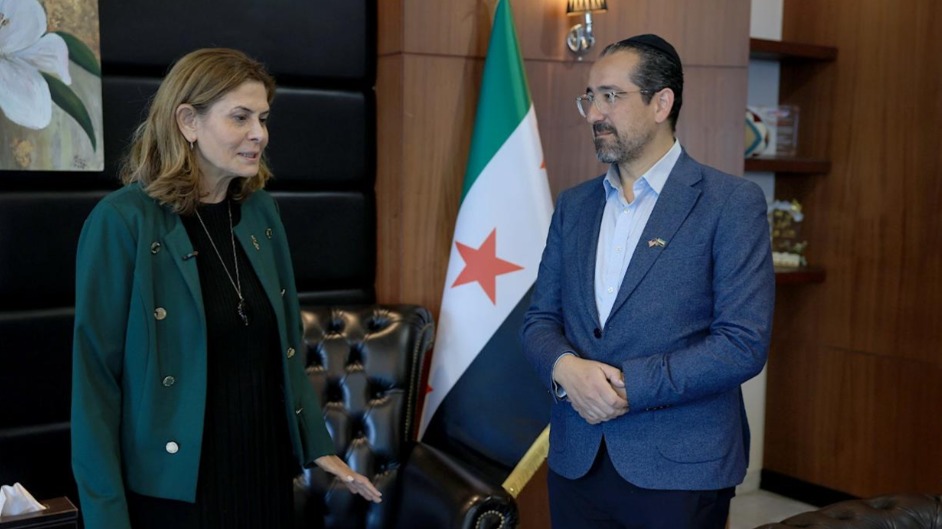More than a third of all Syrians were criminalized or banned from travelling by the Assad regime, interior ministry reveals, announcing major reforms: report

Syria’s interior minister revealed yesterday (Thursday May 22) that 8.2 million Syrians– over a third of the country’s population - were wanted for arrest or banned from travel by the deposed Assad regime, explaining that the Ministry of Interior is currently working to resolve the problem. The new government has already removed over 5.2 million names from the list of individuals wanted by the ousted regime for reasons related to military service, he revealed, with approximately 3 million cases still being addressed, including more than 1,130,000 state employees.
In addition to revealing the shocking statistics about the number of citizens wanted and banned from travel by the former dictatorship, the minister, Anas Khattab, added that the former regime had taken other malicious measures by circulating the names of dissidents as ‘criminals’ and sending them to Interpol. Lebanon had also handed over a list of 2 million Syrian citizens wanted by the former regime. He also explained the difficulties they face in resolving the issue of detainees in Lebanon (Roumieh Prison), adding that efforts are underway to repatriate them to Syria.
Speaking at a lengthy consultative session at the ministry in Damascus, Khattab announced that the new government is to abolish the former regime’s infamously corrupt Political Security Directorate, which will be replaced with an Internal Security Directorate, and that the nation’s police force will henceforth be a civilian body rather than having any military or intelligence role as it did under the Assads.
Reporting the sweeping changes introduced by the ministry, on his Twitter/X account, journalist Omar Alhariri, who attended the consultative session with other media representatives, said that what particularly caught his attention was the new state security structure, including the predicted abolition of the Political Security Division due to its notoriously corrupt role under the former regime. He further revealed that the ministry also announced that the Criminal Security Department will be renamed the Criminal Investigation Department, with its work henceforth to be largely of a technical nature. The minister also announced that a counter-terrorism department is to be created, while the anti-drug and human trafficking departments will retain their current form.
In addition to replacing the Public Security Directorate with an Internal Security Directorate, the minister announced, each Syrian governorate will now have its own director of internal security, and each administrative region will have a branch director of internal security.
Among the positive aspects of the structure, Alhariri wrote, is the elimination of the position of district director, formerly a police officer affiliated with the Ministry of Interior, who is to be replaced by a civilian official reporting to the governor. This will reduce public interaction with officers and give the government a civilian face in its dealings with citizens, rather than the military and police face adopted by the former regime in its dealings with Syria’s citizens.
The minister also spoke in detail about the ministry’s work on improving the country’s e-government system in cooperation with various other ministries, reviewing the numerous comparative experiences of Arab and foreign countries, and contacting major specialist companies to submit tenders for contracts with the ministry. As Alhariri wrote, this will enable Syrians to soon reach the stage of being able to obtain personal documents and access most government services from home or mobile phones via the government’s website through electronic apps.
The minister also revealed that the ministry intends, following the adoption of the new structure, to reintegrate a number of former ministry personnel with good reputations and personal history after undergoing training, as was done with traffic, immigration, and passport ministries’ personnel. In this regard, Alhariri noted, he understood from the intervention of the Director of Criminal Investigations that they have already reinstated some personnel and technical engineers in the Cybercrime Department.
The minister's deputies also provided clarifications regarding the significant technical difficulties they’ve faced in launching the process of registering events in the civil registry. They explained that a pilot project for this process is expected to be launched after Eid al-Adha. They also explained that work is underway to update the ministry's legislation, including the prison law in effect since the days of the French occupation, which ended 79 years ago. They also explained that the new law will take into account international standards stipulated in UN conventions, as the ministry is dissatisfied with the current state of prisons and will work to rehabilitate them in accordance with international standards. The officials also explained that a lawyer will be present in future criminal and even security investigations.
Photo: Syrian Minister of Interior Anas Khattab - via Omar Alhariri, X account
Full report (in Arabic) on the interior ministry's consultative session by Omar Alhariri: https://x.com/omar_alharir/status/1925622343868494087










